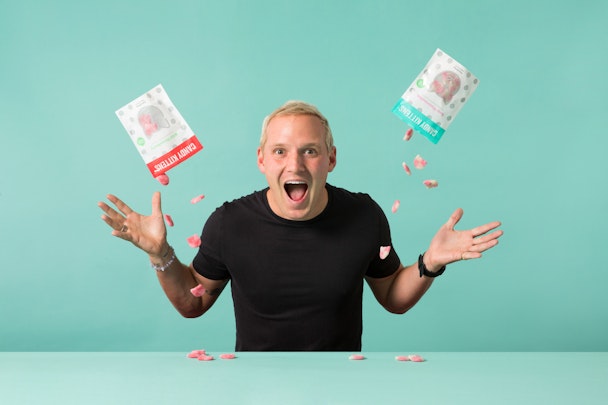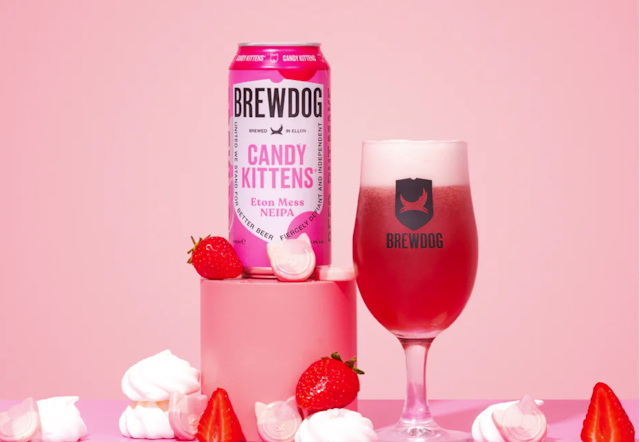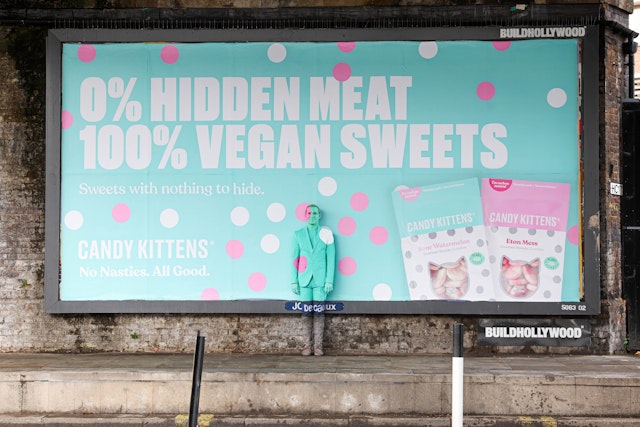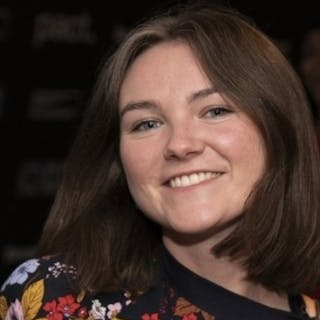Has Jamie Laing found his sweet spot as a marketer?
The Made in Chelsea star turned business owner weighs in on the celebrity-founded brand hype, sharing his thoughts on how to build longevity.

Jamie Laing co-founder of Candy Kittens
Jamie Laing co-founded the Candy Kittens vegan sweets brand in 2012 while starring in Channel 4 reality show Made in Chelsea. Today, you can find his fruit-flavored confectionary in all major UK retailers, the brand having built a name for itself outside of Laing’s initial reality show fame.
Laing, whose great-great-grandfather created the McVitie’s digestive biscuit, tells The Drum that fundamental to the brand’s success is the taste of the sweets themselves.
“What’s great about Candy Kittens is that loads of our consumers have this emotional connection because they’ve seen it being built on a TV show. But if you don’t know who I am, you are still buying the sweets because they are the best sweets out there.”
Advertisement
There has been an explosion in celebrity-founded food and drink brands over the past few years, the most notable being Logan Paul and KSI’s Prime energy drink, which reportedly racked up over $377m in sales in 2023. Other examples include Ed Sheeran’s hot sauce Tingly Teds and Gillian Anderson’s soft drinks business G Spot.
While Laing acknowledges that celebrities and content creators are in a good position to launch brands, he also raises concerns that “consumers will start to not quite believe in the products that are coming out because they’ll just think they’re just being sold to.” He references the example of Russian tennis player Maria Sharapova’s confectionary brand Sugarpova, which he says are just “repackaged sweets.”
“From my experience, we’re seeing that when people and influencers create brands, they tend to cut corners because they want to get it on the shelves quicker or they want to get it done faster.” Whereas, he says, Candy Kittens were developed for two years before hitting shelves.
Advertisement
Building a ‘generational brand’
Celebrities are now looking beyond the ambassador deals to spin out businesses of their own; for example, David Beckham parted ways with Diageo-owned Haig Club with plans to launch his own whisky brand. But the “issue,” Laing says, is that it requires really hard work and a commitment to be in it for the long haul.
“Running a business is a completely full-time job; you have to put 100% into it. God, it takes so long. If anyone ever asks me about running a business, I say strap in for 10 years.”
Co-founder Ed Williams runs the day-to-day operations full-time, which gives Laing the time to build his profile and, in turn, boost the brand. Laing takes ownership of the marketing, drawing on his skills in digital content creation through his 1 million followers on Instagram, plus various podcasts.
Suggested newsletters for you
Marketing so far has been focused on digital and social, along with brand collaborations like its recent hookup with BrewDog, charity partnerships with the LGBTQ+ charity The Albert Kennedy Trust and sponsoring Forest Green Rovers football club.
Now the brand is maturing, the next phase will be to get more challenging and bolder in its marketing. “More billboards and more stunts – that is the road we are going to go down,” says Laing.

A separation between celebrity and the business is the other crucial element; otherwise, it’s just “merchandise,” says Laing. “At the beginning, we wanted to make sure I wasn’t so attached to that brand because you are resting all of your longevity on an individual, and as we know from my early days on Made in Chelsea, I probably wasn’t the most reliable.”
Laing is detached from the product packaging and only features on the ‘About Us’ tab on the company website. “There has to be a slight separation; otherwise, what are you selling? You could just be selling lawnmowers.”
No Nasties campaign
Candy Kittens’ major USP is that all of its products are vegan. While its point of difference has served it well in its first decade of growth, Laing and Williams now want to use Candy Kittens’ vegan credentials to advocate for change within the wider sweet industry.
“When we started the business, we had no idea there was meat in sweets – I didn’t even know what gelatine meant,” says Williams. “But now we’ve seen it in the flesh, literally. It’s pretty grim. You don’t want that stuff in your food.”
Candy Kittens has developed the ‘No Nasties’ brand platform, the aim of which, says Williams, “is to educate consumers about animal products in sweets and then, secondly, to show them that Candy Kittens is the answer.”
The first creative from its ‘No Nasties’ platform was an out-of-home stunt with Laing painted to blend in with the billboard behind. The concept plays on the ‘hidden’ ingredients in sweets. Williams says the billboard is the start of the brand pushing into more stunt-based marketing to “ruffle the feathers” of the confectionery industry.

“The more we can shock and surprise people with these ideas [like the billboard] and highlight that hidden message, the more fun it will be,” says Williams. “We are trying to be as challenging and rebellious towards the industry as possible. But without losing that sense of fun and personality that Candy Kittens is known for.”
This is where Laing’s personality can truly be leveraged. “People see me as a light-hearted individual,“ he says. “But, perhaps by shifting into the entrepreneurial space and having that light-hearted person as a founder, they will understand that things can be done in a fun and light-hearted way.”

